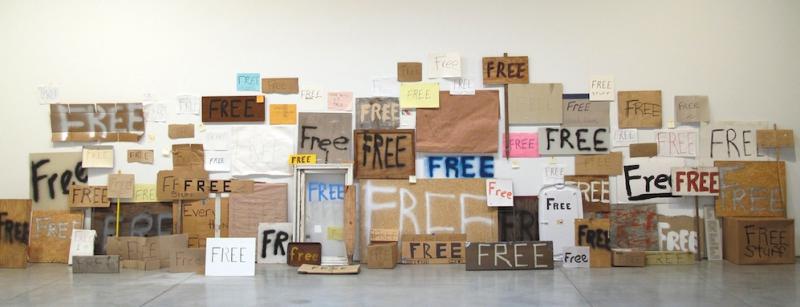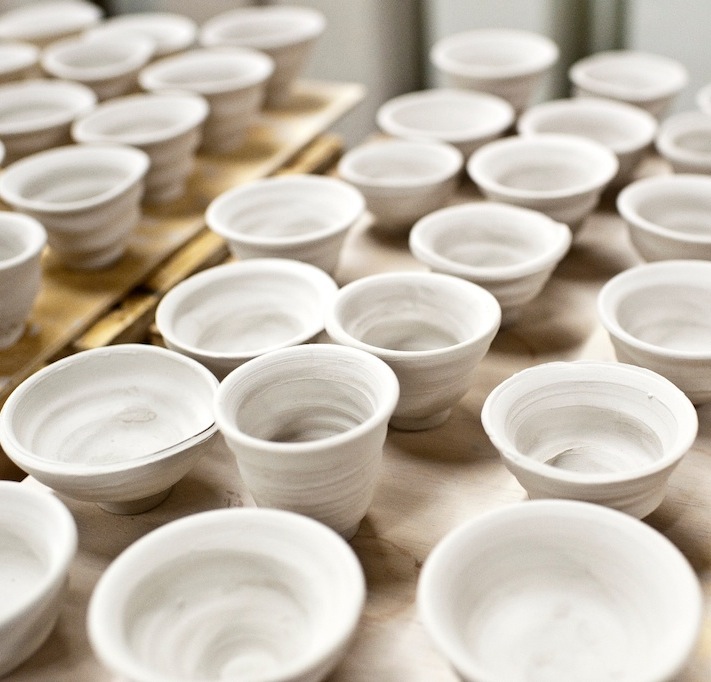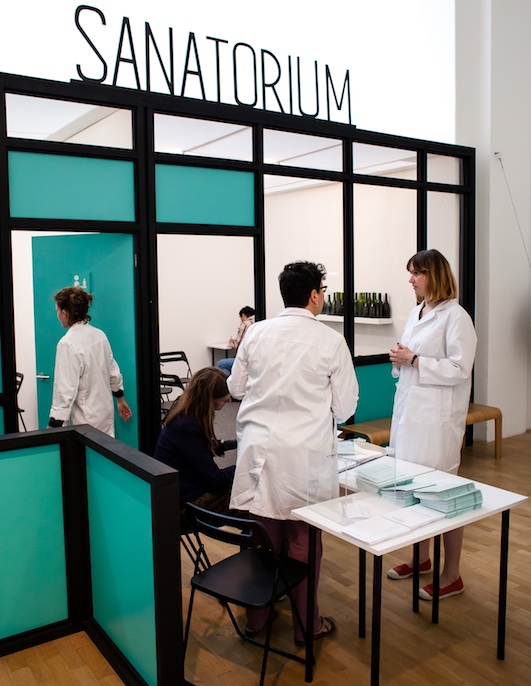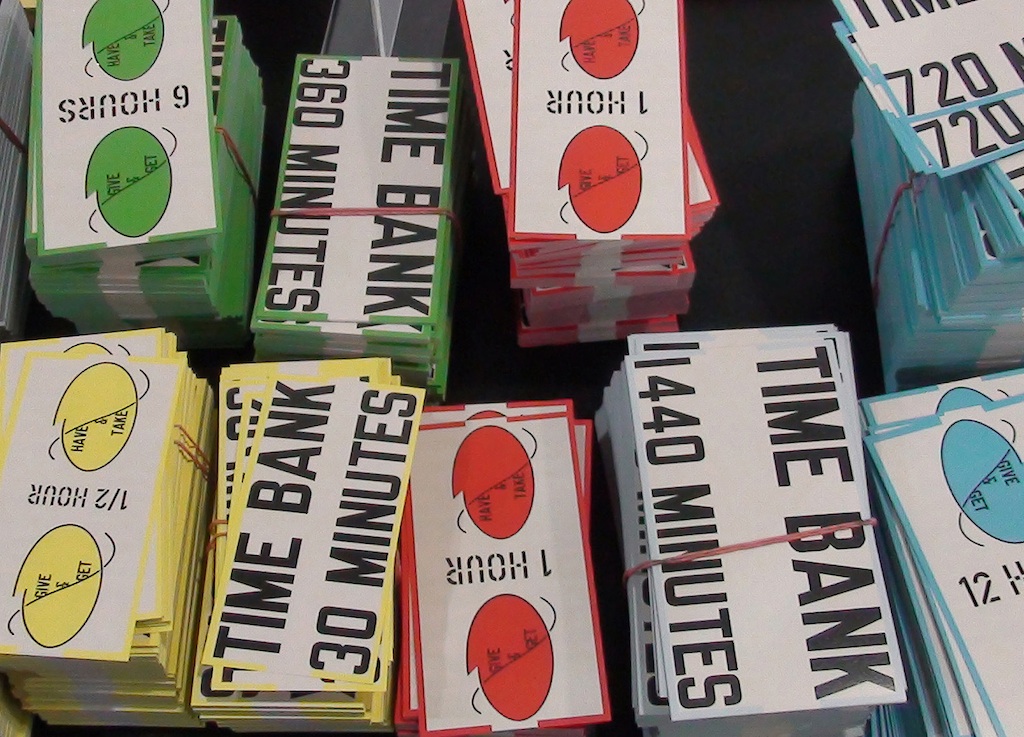The Spirit of Utopia, Whitechapel Gallery | reviews, news & interviews
The Spirit of Utopia, Whitechapel Gallery
The Spirit of Utopia, Whitechapel Gallery
Utopian visions morph into muddle-headed dreaming

Some artists seem to need a reality check. The Spirit of Utopia is billed as a show of artists “who speculate on alternative futures for society, the economy and the environment”; but anyone anticipating cogent analysis or visionary ideas will be disappointed. The exhibition consists of a bunch of dreamers who imagine that an art context gives social significance to weak or wacky ideas. It doesn’t.
Theaster Gates believes a gallery “should be an open space that questions modes of production, systems of power, and access to the imagination for everyone” – a laudable goal that should inspire hard-hitting and provocative work. What we get, though, is a pottery demonstration and a display of new bricks and bowls (pictured below right). Gate’s practice is, we are told, “a call for action” yet we are not even invited to join in. The Chicago-based artist is obviously unaware of the many ceramics classes in Londoners where you learn to actually throw and fire a pot – an infinitely more empowering experience than merely watching.
 Guerilla gardeners are in action all over Britain transforming patches of urban wasteland into productive plots, or using hydroponics to grow plants indoors. Design group Wayward Plants are at the forefront of such initiatives; their first London garden was a derelict site in Old Street. Evidence is emerging that planting at the right time in the lunar cycle improves plant growth and, in this show, Wayward Plants experiment with the idea. It's exciting stuff that encourages radical shifts in farming; what we see, though, is an uninspiring display of seedlings under artificial light and messages from primary school children to imaginary gardeners on the moon. In grimy Whitechapel, which cries out for some radical solutions, such whimsy feels like a lost opportunity.
Guerilla gardeners are in action all over Britain transforming patches of urban wasteland into productive plots, or using hydroponics to grow plants indoors. Design group Wayward Plants are at the forefront of such initiatives; their first London garden was a derelict site in Old Street. Evidence is emerging that planting at the right time in the lunar cycle improves plant growth and, in this show, Wayward Plants experiment with the idea. It's exciting stuff that encourages radical shifts in farming; what we see, though, is an uninspiring display of seedlings under artificial light and messages from primary school children to imaginary gardeners on the moon. In grimy Whitechapel, which cries out for some radical solutions, such whimsy feels like a lost opportunity.
“Today, especially in cities”, writes Mexican artist Pedro Reyes, “there is a vast population of unattended victims of depression, loneliness, neurosis, family violence, suicide, and other pathologies.” To address this serious problem he wants to set up a chain of clinics “almost as a roadside attraction” or “family entertainment” (pictured below left). Rather than therapists, these would be manned by white-coated volunteers trained by the artist.
 Visitors to the exhibition can sign up for a variety of “therapies” ranging from beating up a balloon, employing symbolic gestures to address a problem and telling your life story through objects that you arrange in a model gallery. Visitors have to sign a declaration acknowledging “that this is an art project and not psychotherapy” and they participate at their own risk. At best this is harmless quackery, but at worst it is a dangerously naive game that could spark an emotional crisis and tip someone over the edge.
Visitors to the exhibition can sign up for a variety of “therapies” ranging from beating up a balloon, employing symbolic gestures to address a problem and telling your life story through objects that you arrange in a model gallery. Visitors have to sign a declaration acknowledging “that this is an art project and not psychotherapy” and they participate at their own risk. At best this is harmless quackery, but at worst it is a dangerously naive game that could spark an emotional crisis and tip someone over the edge.
The Danish collective, Superflex has an answer to the financial crisis afflicting most of the capitalist world. Forget mass unemployment, forget cuts in social services, simply close your eyes and allow yourself to be taken on a journey by a hypnotist on film. This will enable you to wake up “feeling comfortable, fresh and happy” despite the fact that you’ve just envisaged losing your job, house and everything else – by turning your back on financier George Soros and the free market which he has manipulated so cleverly. Such irresponsibility would be funny, if the problems addressed weren’t so pressing and so serious.
Thank goodness for British artist Peter Liversidge. Free Signs (main picture) is a display of yard signs scrawled on bits of paper, wood, and card which he picked up in America by swapping genuine signs offering free stuff for replicas made by himself. Collected together, the signs demonstrate the existence of a healthy underground economy of free exchange – a real alternative, in other words, to the market.
 And finally, we get an intelligent and creative contribution from Time/Bank (Julieta Aranda & Anton Vidokle) in the form of a film (pictured right) that considers concepts of time and its relationship to money. Time, they point out, is “the most valuable natural resource on the planet”; it “keeps everything from happening at once” and is “the measure of change”. They ask cogent questions such as, “What do we want to make equivalent to what?” and point out that “As the world eats away at its resources, the lines between having no choice and desiring something different begin to blur.”
And finally, we get an intelligent and creative contribution from Time/Bank (Julieta Aranda & Anton Vidokle) in the form of a film (pictured right) that considers concepts of time and its relationship to money. Time, they point out, is “the most valuable natural resource on the planet”; it “keeps everything from happening at once” and is “the measure of change”. They ask cogent questions such as, “What do we want to make equivalent to what?” and point out that “As the world eats away at its resources, the lines between having no choice and desiring something different begin to blur.”
New Harmony, a utopian community set up in Indiana in 1825 by Welshman Robert Owen, is cited as an alternative economic model. Libraries and schooling were free and money took the form of promisary notes offering time spent, such as an hour’s labour. Time/Bank have previously set up platforms for trading skills and one wall is plastered with offers in various languages to bake cakes, teach horse-riding, move pianos or cook Taiwanese food. The BBC got there first of course – the system operated several years ago in Ambridge! – and real towns such as Totnes, Lewes and Stroud have their own local currencies. Unfortunately, Time/Bank have no plans to implement the scheme here, which is a shame because I could do with someone to tile my bathroom and I could teach you to dance or sing and thereby forget all your economic woes.
Explore topics
Share this article
Add comment
The future of Arts Journalism
You can stop theartsdesk.com closing!
We urgently need financing to survive. Our fundraising drive has thus far raised £33,000 but we need to reach £100,000 or we will be forced to close. Please contribute here: https://gofund.me/c3f6033d
And if you can forward this information to anyone who might assist, we’d be grateful.

Subscribe to theartsdesk.com
Thank you for continuing to read our work on theartsdesk.com. For unlimited access to every article in its entirety, including our archive of more than 15,000 pieces, we're asking for £5 per month or £40 per year. We feel it's a very good deal, and hope you do too.
To take a subscription now simply click here.
And if you're looking for that extra gift for a friend or family member, why not treat them to a theartsdesk.com gift subscription?
more Visual arts
 Help to give theartsdesk a future!
Support our GoFundMe appeal
Help to give theartsdesk a future!
Support our GoFundMe appeal
 Bogancloch review - every frame a work of art
Living off grid might be the meaning of happiness
Bogancloch review - every frame a work of art
Living off grid might be the meaning of happiness
 Do Ho Suh: Walk the House, Tate Modern review - memories are made of this
Home sweet home preserved as exquisite replicas
Do Ho Suh: Walk the House, Tate Modern review - memories are made of this
Home sweet home preserved as exquisite replicas
 Ed Atkins, Tate Britain review - hiding behind computer generated doppelgängers
Emotions too raw to explore
Ed Atkins, Tate Britain review - hiding behind computer generated doppelgängers
Emotions too raw to explore
 Echoes: Stone Circles, Community and Heritage, Stonehenge Visitor Centre review - young photographers explore ancient resonances
The ancient monument opens its first exhibition of new photography
Echoes: Stone Circles, Community and Heritage, Stonehenge Visitor Centre review - young photographers explore ancient resonances
The ancient monument opens its first exhibition of new photography
 Hylozoic/Desires: Salt Cosmologies, Somerset House and The Hedge of Halomancy, Tate Britain review - the power of white powder
A strong message diluted by space and time
Hylozoic/Desires: Salt Cosmologies, Somerset House and The Hedge of Halomancy, Tate Britain review - the power of white powder
A strong message diluted by space and time
 Mickalene Thomas, All About Love, Hayward Gallery review - all that glitters
The shock of the glue: rhinestones to the ready
Mickalene Thomas, All About Love, Hayward Gallery review - all that glitters
The shock of the glue: rhinestones to the ready
 Interview: Polar photographer Sebastian Copeland talks about the dramatic changes in the Arctic
An ominous shift has come with dark patches appearing on the Greenland ice sheet
Interview: Polar photographer Sebastian Copeland talks about the dramatic changes in the Arctic
An ominous shift has come with dark patches appearing on the Greenland ice sheet
 Donald Rodney: Visceral Canker, Whitechapel Gallery review - absence made powerfully present
Illness as a drive to creativity
Donald Rodney: Visceral Canker, Whitechapel Gallery review - absence made powerfully present
Illness as a drive to creativity
 Noah Davis, Barbican review - the ordinary made strangely compelling
A voice from the margins
Noah Davis, Barbican review - the ordinary made strangely compelling
A voice from the margins
 Best of 2024: Visual Arts
A great year for women artists
Best of 2024: Visual Arts
A great year for women artists
 Electric Dreams: Art and Technology Before the Internet, Tate Modern review - an exhaustive and exhausting show
Flashing lights, beeps and buzzes are diverting, but quickly pall
Electric Dreams: Art and Technology Before the Internet, Tate Modern review - an exhaustive and exhausting show
Flashing lights, beeps and buzzes are diverting, but quickly pall

Comments
What a shame that this was